Baltimore Orioles: The franchise all-time bracket
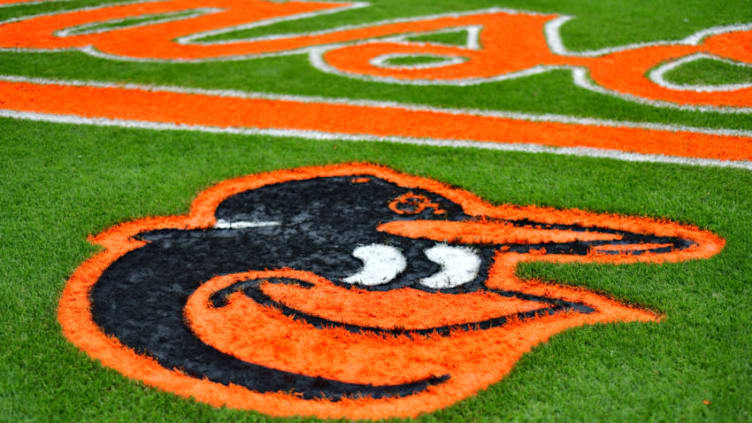
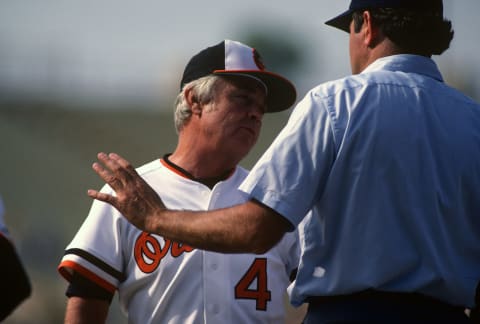
The Baltimore Orioles dominated the AL for nearly 2-decades. Several teams from that era are candidates as best in franchise history, but which is best?
For decades in the mid to late 20th Century, the Baltimore Orioles ranked among baseball’s dominant teams.
Between 1966 and 1983, the Orioles won three World Series, played in three others, won eight American League or AL East pennants, and won 500 more games than they lost.
More from Call to the Pen
- Philadelphia Phillies, ready for a stretch run, bomb St. Louis Cardinals
- Philadelphia Phillies: The 4 players on the franchise’s Mount Rushmore
- Boston Red Sox fans should be upset over Mookie Betts’ comment
- Analyzing the Boston Red Sox trade for Dave Henderson and Spike Owen
- 2023 MLB postseason likely to have a strange look without Yankees, Red Sox, Cardinals
So it’s no wonder that the era dominates the Orioles’ All-Time bracket. Among the eight teams playing for the title of best in Orioles history, five are from that period: 1966, 1970 and 1983 World Champions as well as the 1969 and 1979 American League pennant winners.
One could as easily include the AL champion 1971 Orioles, but the era is so well represented already that throwing that team in would be overkill.
Selecting the other three franchise representatives is not difficult. The 1997 and 2014 Orioles won the franchise’s two most recent division titles. It is also appropriate to save one spot for the only pennant winner from the franchise’s pre-Baltimore days, the 1944 St. Louis Browns. That makes eight.
The format is identical to previous bracket challenges. Each matchup in the tournament is decided based on seven criteria. You can think of each as a ‘game,’ the winner of four games advancing. The seven criteria are:
- Game 1: Regular season winning percentage.
- Game 2: Post-season winning percentage
- Game 3: Team OPS+
- Game 4: Team ERA+
- Game 5 (if necessary): Team WAR
- Game 6 (if necessary: Fielding percentage above the league average for the season in question.
- Game 7 (if necessary): The standard for Game 7 is Hall of Famers or likely future Hall of Famers.
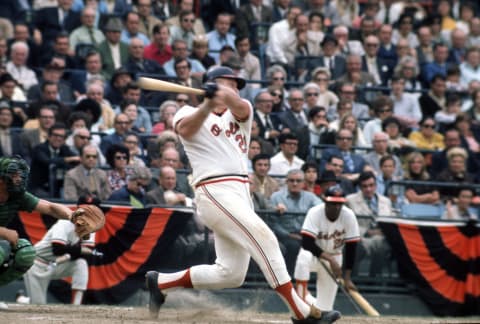
Baltimore Orioles: The All-Time Bracket
No. 1 vs. 8 seed
Among the great Orioles teams of the 1970 era dynasty, the 1969 club was probably the best. Granted, it famously was upset by the New York Mets in that fall’s World Series. But the Orioles won a franchise-record 109 games.
Frank Robinson and Brooks Robinson were the on-field leaders. Frank batted .308 with 32 home runs and 100 RBIs, while Brooks added 84 RBIs and played a spectacular third base. At first, Boog Powell batted .304 with 37 homers and 121 RBIs.
The pitching staff was deep. Left-handers Mike Cuellar and Dave McNally combined for 43 victories in 559 innings of work. Jim Palmer added a 16-4 record from the right side.
The 1944 St. Louis Browns were the only American League pennant winner in that portion of the franchise’s history. Their reputation is tainted by the fact that the Browns won while some of the American League’s best stars – Ted Williams, Joe DiMaggio – were in military service. But if the Browns were not a great team, they were at least a solid one for the era.
Outfielder Mike Kreevich batted .301 and shortstop Vern Stephens added 109 RBIs to lead the offense. Nelson Potter was 19-7 in 29 starts and Jack Kramer added a 17-13 record, the two combining for 490 innings.
light. Related Story. Atlanta Braves: The definitive franchise all-time bracket
Game 1: The 1969 club’s 109-53 record translates to a .673 regular-season percentage. The 1944 Browns won the pennant at 89-65 .578.
Game 2: The 1969 club swept Minnesota in the first division series before losing to the Mets in five. That’s a .500 postseason record. The 1944 Browns lost the World Series to the Cardinals in six games.
Game 3: The 1944 Browns had an 87 team OPS+. Offense, clearly, was not their strength. The 1969 Orioles put together a 110 OPS+. They lead 3-0.
Game 4: The 1969 Orioles rely on a deep pitching staff to finish off the 1944 Browns. Their 126 staff ERA+ is superior to St. Louis’ 115.
Result: 1969 in four games
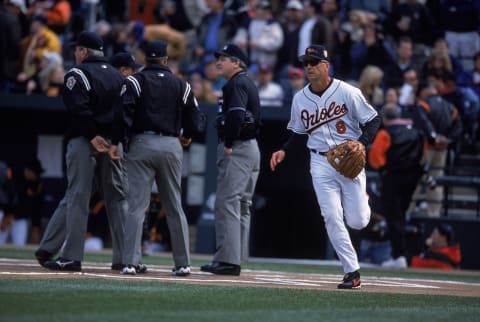
Baltimore Orioles: The All-Time Bracket
No. 4 vs. 5 seed
The 1983 Orioles won the AL East by six games, beat Chicago in the ALCS and then took out the Philadelphia Phillies in a five-game World Series. This was the last great representative of the franchise’s best era.
The strength lay in the pitching staff. Scott McGregor (18-7) and Mike Flanagan (12-4) were established veterans, and Mike Boddicker (16-8) provided strong support.
The bullpen triumvirate of Tippy Martinez, Sammy Stewart, and Tim Stoddard delivered more than 300 innings of usually solid relief, winning 22 games and saving 37 others.
Offensively the Orioles had budding star Cal Ripken Jr. (.318, 27 home runs, 102 RBIs) alongside established star Eddie Murray (.306, 33 homers, 111 RBIs).
The 2014 Orioles won 96 games for manager Buck Showalter. DH Nelson Cruz hit 40 home runs with 108 RBIs to pace the offense. The mound staff lacked a dominant presence, Wei-Yin Chen leading at 16-6, 3.54 in 31 starts. Closer Zack Britton was the stabilizing force, saving 37 games.
Related Story. New York Mets: The definitive franchise all-time bracket. light
Game 1: The 1983 club had a 98-64 .605 regular-season percentage, two games better than 2014’s 96-66 .593.
Game 2: The 2014 Orioles swept the Detroit Tigers in a three-game division series, they were swept by the Kansas City Royals in the ALCS. That’s a .429 post-season percentage. The 1983 club played .778 ball in post-season.
Game 3: In 1983, Orioles hitters combined for a 111 OPS+. The 2014 Orioles only got to 104.
Game 4: The 2014 team avoids a sweep by winning the ERA+ battle. Their 115 mark is six points better than 1983’s 109.
Game 5: The 2014 ballclub had 46.1 WAR, That was about two points better than 1983’s 44.4 WAR.
Game 6: The two teams are closely matched in fielding percentage. In 2014 the Orioles fielded .986, 1.867 points better than the American League average. In 1983, they fielded .981, 1.576 points better than the league average. This series may have started out as a 3-0 lead for 1983, but it’s going to a seventh game.
Game 7: The 1983 Orioles produced three Hall of Famers: Ripken, Murray, and pitcher Jim Palmer. To count three future Hall of Famers among the 2014 roster, you have to grant future immortality to Manny Machado, Nelson Cruz, and Zack Britton. At least two of those seem highly unlikely.
Winner: 1983 in seven games
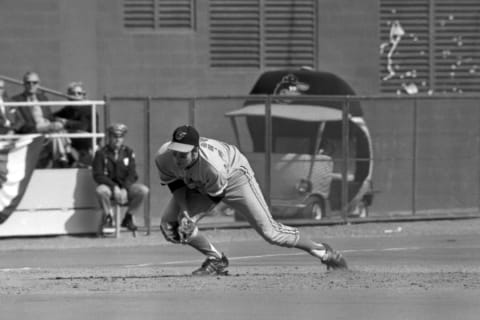
Baltimore Orioles: The All-Time Bracket
No. 2 vs. 7 seed
The 1970 champions completed the task left unfulfilled in 1 970, beating the Cincinnati Reds in a five-game World Series. Powell drove in 114 runs and took home the Most Valuable Player Award. Frank Robinson batted .306 and Brooks Robinson threw in 94 RBIs.
The pitching staff featured three 20-game winners, Cuellar and McNally both won 24 in 40 starts each while Palmer added 20 wins in 39 starts. As a trio, they worked nearly 700 of the team’s 1,478 innings.
The 1997 club beat New York by two games for the AL East title but lost the ALCS to Cleveland in six games. Second baseman Roberto Alomar hit .333 while first baseman Rafael Palmeiro slugged 38 home runs with 110 RBIs.
The pitching staff was led by Mike Mussina’s 15-8 record and 3.20 ERA in 33 starts. Jimmy Key was 16-10.
light. Related Story. San Diego Padres: The franchise all-time bracket
Game 1: In 1970 the Orioles rolled up a 108-54 record for a .667 percentage. The 1997 team was 9864, .605.
Game 2: The 1970 club had a .875 post-season record, losing only that one World Series game to the Reds. The 1997 team played .500 post-season ball.
Game 3: In 1997 the Orioles had a 103 OPS+. Against the 1970 team’s 105, that’s not good enough.
Game 4: The 1970 Orioles present a deep and talented mound staff. It produced a 116 ERA+. As good as the 1997 staff’s 113 ERA+ was, it’s not good enough to keep this series alive.
Result: 1970 in four games
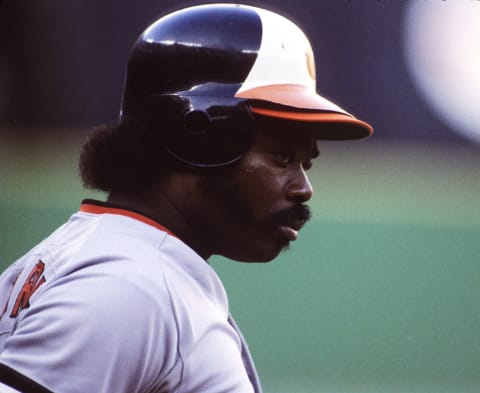
No. 3 vs. 6 seed
The 1966 champions won the franchise’s first World Series title and did it with a spectacular four-game sweep of the Los Angeles Dodgers. The favored Dodgers scored only two runs in that series, none after the third inning of the first game. The last two games were both 1-0 shutouts, by Wally Bunker and Dave McNally respectively.
Frank Robinson, acquired the previous winter from Cincinnati, won the American League MVP award on a .316 average with 40 home runs and 122 RBIs. Powell added 34 homers and 109 RBIs.
Palmer led in victories with 15, but those Orioles were not dependent on one or two arms. Only Palmer and McNally pitched more than 150 innings that summer.
In 1979 Baltimore let a 3-1 World Series lead slip away to the Pittsburgh Pirates. Murray hit 25 home runs with 99 RBIs, and outfielder Ken Singleton drove in 111 with 35 home runs.
Flanagan was 23-9 with a 3.08 ERA over 265 innings. Manager Earl Weaver relied on a deep bullpen led by Don Stanhouse, Sammy Stewart and Tippy Martinez. Together they were 25-11 with 25 saves in 267 innings.
Related Story. San Francisco Giants: The franchise all-time bracket. light
Game 1: The 1979 team was 102-57, a .642 regular-season percentage. The 1966 team finished 97-63, a .606 percentage, but one game short of 1979.
Game 2: Baltimore compiled a .444 post-season percentage in 1979. With no pre-World Series games, the 1966 team’s post-season record stands at an impregnable 1.000.
Game 3: Behind Powell and the Robinsons, the 1966 club had a 111 OPS. That’s enough to beat 1979’s 106.
Game 4: The 1979 team evens this series at two games each. Its 123 ERA+ easily trumps 1966’s 102.
Game 5: In 1979 the Orioles amassed 52.0 WAR. The 1966 club only got to 46.0 WAR.
Game 6: The 1979 Orioles look to wrap up the series on defense. Their .980 fielding percentage is two points better than the league average. But in 1966, the Orioles fielded .981, three points better than the league average.
Game 7: the 1966 Orioles count three Hall of Famers: Palmer plus both Robinsons. The 1979 Orioles only have two, Palmer and Murray.
Result: 1966 in seven games
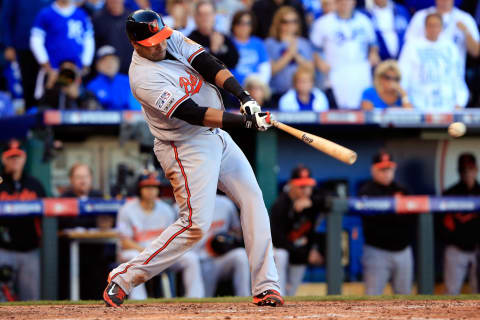
Baltimore Orioles: The All-Time Bracket
Semi-finals
The 1966, 1969, and 1970 teams fight it out for the best of the era with 2014 as the interloper.
1969 vs. 2014
Game 1: The 1969 Orioles had the best regular-season percentage in franchise history at .673. That’s 80 points better than in 2014.
Game 2: In 1969 the Orioles compiled a .500 post-season record. The 2014 team’s post-season record was just .429.
Game 3: The 1969 Orioles had a 110 OPS+, six points better than 2014’s 104.
Game 4: The 2014 Orioles send their 115 staff ERA+ out to prevent a sweep. Not good enough: the 1969 staff had a 126 ERA+.
Result: 1969 in four games
Related Story. Los Angeles Dodgers: The franchise all-time bracket. light
1970 vs. 1966
These are similar teams, a principal difference being the replacement of Hank Bauer by Earl Weaver as manager.
Game 1: the 1966 Orioles were 97-63 .606 during the regular season. In 1970 the Orioles were 108-54, .667…that’s 11 games better.
Game 2: The 1966 team’s perfect 1.000 post-season percentage prevails over 1970s .875.
Game 3: In 1966 Orioles hitters combined for a 111 OPS+. The 1970 champions had a 105 OPS+. The 1966 team takes a 2-1 lead in this series.
Game 4: The 1970 Orioles had a 116 ERA+. But in 1966 the Orioles staff pitched to a 123 ERA+. They are one game away from a victory.
Game 5: The 1966 Orioles rolled up a 52.0 WAR. That’s very good…but in 1970 the Orioles had 56.8 WAR.
Game 6: The 1966 Orioles fielded .981, three points better than the league average. In 1970 the Orioles also fielded .981, also three points better. Taken out to further decimal points, the margins favor 1966.
Result: 1966 in six games
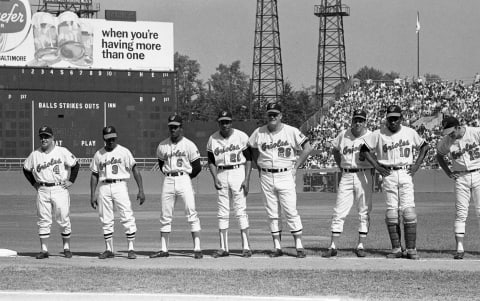
Baltimore Orioles: The All-Time Bracket
The Championship
The Orioles all-time bracket concludes in a contest of two teams featuring identical on-field leaders and separated by just two seasons.
More from Baltimore Orioles
- Baltimore Orioles: John Angelos should learn that silence is golden
- Watch out American League, the Baltimore Orioles are here to stay
- Stock Up, Stock Down: MLB trade deadline winners and losers
- MLB Rumors: Baltimore Orioles, Boston Red Sox, Minnesota Twins
- Baltimore Orioles: How about a little love in MLB history for Jim Palmer?
Game 1: The 1969 team’s .673 regular-season percentage is untouchable by franchise standards…
Game 2: …As is the 1966 club’s 1.000 post-season percentage.
Game 3: In 1966 the Orioles hit for a team 111 OPS+. The 1969 team compiled a 110 OPS+, one point shy.
Game 4: The 1966 Orioles only managed a 102 ERA+. In 1969 the Orioles had a 126 ERA+. This championship series is even at two games each.
More. Baltimore Orioles: The worst contracts since 2010. light
Game 5: The 1966 Orioles rode Frank Robinson’s 7.7 to a 46.0 WAR. In 1969, Robinson had 7.5 WAR, but Paul Blair added 7.1 and the team reached a franchise record 61.8.
Game 6: Needing a win to stay alive, the 1966 team presents its .981 fielding percentage, three points better than the AL average. The 1969 team counters with its .984 average, a full six points superior to the league average.
Result: 1969 in six games
Next. Roberto Barbón: The first Cuban star in Japan. dark
In ousting the 1944 Browns plus the 2014 and 1966 Orioles, the 1969 team was never taken to a seventh game. The record will show that those Orioles rostered three Hall of Famers: Palmer plus both Robinsons.